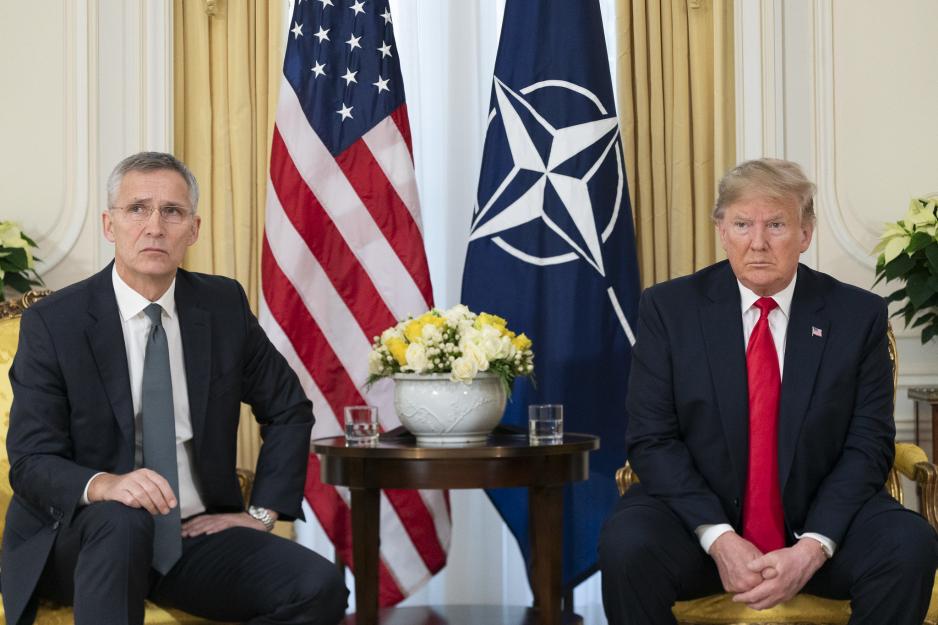Newsletter: Let's Talk About China

NATO Secretary-General Jens Stoltenberg (left) and US President Donald Trump. Photo: The White House
Dear reader!
China a “far-from-Arctic” state, even though it likes to refer to itself as a such, has been at the center of everyone’s attention this week – in the High North too.
It all started with the USA’s wanting NATO to “express concerns” regarding China prior to the NATO summit in London last Monday and Tuesday.
Difficult balancing act
However, NATO chief Jens Stoltenberg will have to weigh his words carefully. Because a NATO offensive against China, which may lead to the big power’s connecting tighter with Russia, may potentially lead to an already difficult balancing act becoming increasingly difficult. Norway has to remain close with the USA while not being shut out by China and maintaining attention towards Russia.
NATO and the USA are also the topic of Editor-in-Chief Arne O. Holm’s ever-observant Friday op-ed. It is about how Norway and the NATO organization as such “dance along with the music from a corrupted American president”.
Someone want to talk more about China…
This week, the Danish military intelligence services published its risk assessment report for 2019 and it is introduced by a chapter about the Arctic, “as big power interest in the Arctic has direct effects on and increased significance for the Kingdom of Denmark”. The Danes fear that China uses its polar research to legitimize military presence in the Arctic.
However, the Danes are not the only ones arguing it is about time we start talking about China. The panelists at the recent Halifax International Security Forum all expressed concerns about China’s increasing power in the Arctic, and the issue dominated the debate both on and off stage.
Researcher at the Norwegian Institute of International Affairs (NUPI), Hans Jørgen Gåsemyr, welcomes increased focus on China. However, he argues that it should have come sooner, as the developments in China have been ongoing for some 30 years. He believes the reason for all the noise to be the fact that the attention comes all of a sudden and from many different sides at the same time. He warns Norway and other countries about “bending over” for what he refers to as “an American campaign”.
…others less so
Others, on the other hand, are tired of talking about China.
Heather Exner-Pirot, Professor at the Observatory for Politics and Security in the Arctic (OPSA) in Canada does not see the risk “everyone” is talking about. “China has neither experience nor capacities in the Arctic, at least not from a military perspective” she said during a debate about security in the Arctic in Brussels last week.
Nor does she appreciate the fact that we are provoked when China characterizes itself as a “near-Arctic” state while we do not object when other non-Arctic states do the same.
Not unexpectedly, the security officer from the US State Department on the same panel disagreed rather strongly with her.
Climate summit in Madrid
This week, another important meeting has also taken place. In Madrid, negotiators from 200 countries were gathered to address our shared major challenge: Climate changes.
A key theme at the UN climate negotiations in Madrid is the fact that the countries increase their ambitions under the Paris Accord. Prior to the meeting, UN Secretary-General Anónio Guterres has said that the world’s response to the climate crisis so far has been “completely inadequate”. [Norwegian only]
The conference takes place within a stream of bad news about climate changes over the past few days, including these:
- Recent climate figures show dramatic increase in Svalbard temperatures
- The World’s Meteorological Organisation announced that the concentrations of climate gases reachd its highest registered level ever in 2018
- The UN Environmental Program demonstrated that there is a massive gap between the current government plans and what is actually needed to keep us below a global temperature increase of 1.5 degrees.
Runways and roads melt away
In High North News, you can also read about how Greenland’s main airport in Kangerlussuaq must shut down for commercial traffic in 2024 due to thawing permafrost destroying the runway.
That is just one in a long list of infrastructure projects in the Arctic that run the risk of being destroyed because the ground thaws. Recent studies show that 70 percent of the roads in the region, buildings and airports may be affected by thaw during the next 30 years.
Also read: Russia's Brand New Nuclear Icebreaker “Arktika” to Begin Sea Trials
With these stories we wish you all the best for the weekend!
Siri Gulliksen Tømmerbakke
News Editor, High North News
